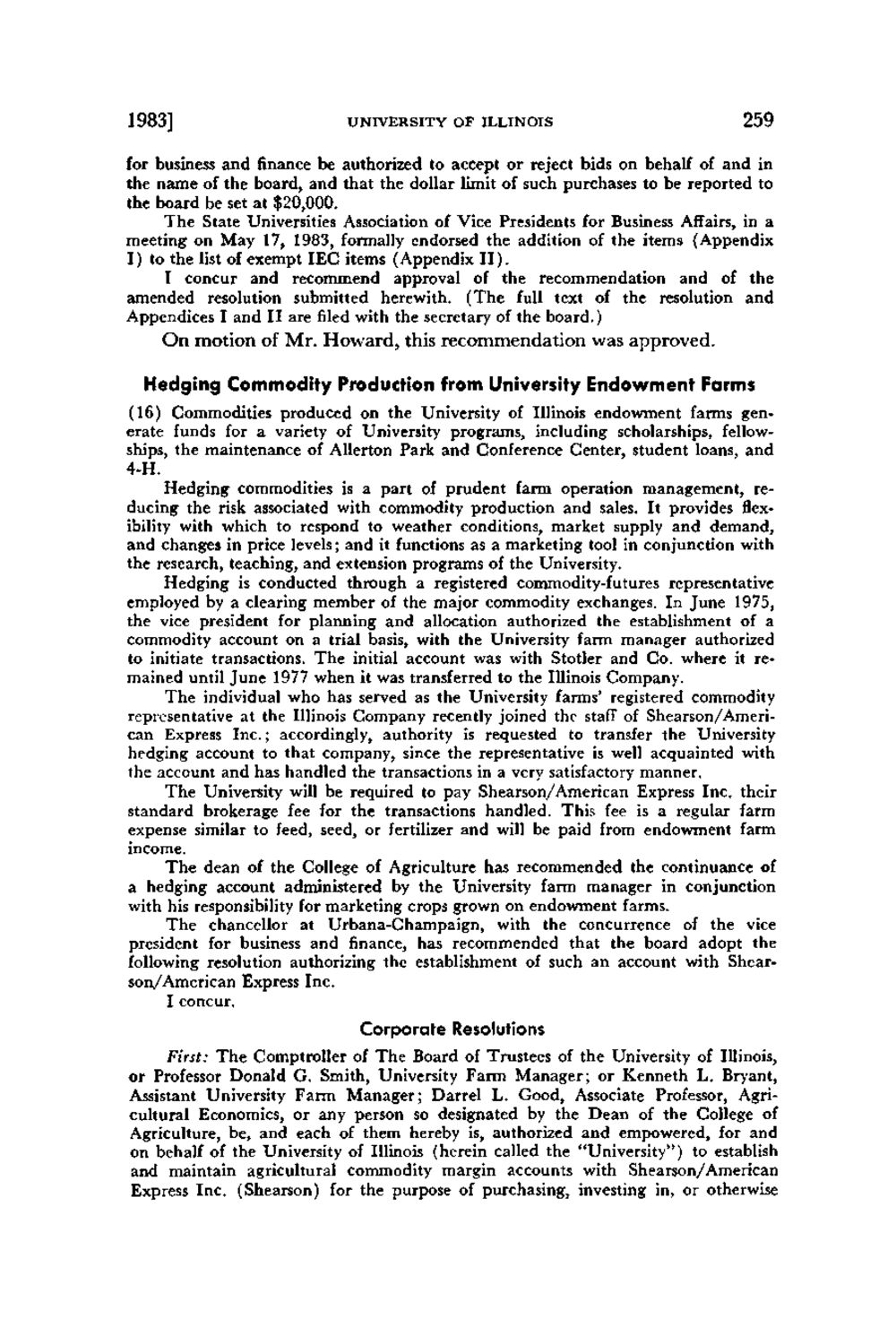| |
| |
Caption: Board of Trustees Minutes - 1984
This is a reduced-resolution page image for fast online browsing.

EXTRACTED TEXT FROM PAGE:
1983] UNIVERSITY OF ILLINOIS 259 for business and finance be authorized to accept or reject bids on behalf of and in the name of the board, and that the dollar limit of such purchases to be reported to the board be set at $20,000. The State Universities Association of Vice Presidents for Business Affairs, in a meeting on May 17, 1983, formally endorsed the addition of the items (Appendix I) to the list of exempt IEC items (Appendix I I ) . I concur and recommend approval of the recommendation and of the amended resolution submitted herewith. (The full text of the resolution and Appendices I and I I are filed with the secretary of the board.) O n m o t i o n of M r . H o w a r d , this r e c o m m e n d a t i o n w a s a p p r o v e d . Hedging Commodity Production from University Endowment Farms (16) Commodities produced on the University of Illinois endowment farms generate funds for a variety of University programs, including scholarships, fellowships, the maintenance of Allerton Park and Conference Center, student loans, and 4-H. Hedging commodities is a part of prudent farm operation management, reducing the risk associated with commodity production and sales. It provides flexibility with which to respond to weather conditions, market supply and demand, and changes in price levels; and it functions as a marketing tool in conjunction with the research, teaching, and extension programs of the University. Hedging is conducted through a registered commodity-futures representative employed by a clearing member of the major commodity exchanges. In June 1975, the vice president for planning and allocation authorized the establishment of a commodity account on a trial basis, with the University farm manager authorized to initiate transactions. The initial account was with Stotler and Co. where it remained until June 1977 when it was transferred to the Illinois Company. The individual who has served as the University farms' registered commodity representative at the Illinois Company recently joined the staff of Shearson/American Express Inc.; accordingly, authority is requested to transfer the University hedging account to that company, since the representative is well acquainted with the account and has handled the transactions in a very satisfactory manner. The University will be required to pay Shearson/American Express Inc. their standard brokerage fee for the transactions handled. This fee is a regular farm expense similar to feed, seed, or fertilizer and will be paid from endowment farm income. T h e dean of the College of Agriculture has recommended the continuance of a hedging account administered by the University farm manager in conjunction with his responsibility for marketing crops grown on endowment farms. The chancellor at Urbana-Champaign, with the concurrence of the vice president for business and finance, has recommended that the board adopt the following resolution authorizing the establishment of such an account with Shearson/American Express Inc. I concur. Corporate Resolutions First: The Comptroller of The Board of Trustees of the University of Illinois, or Professor Donald G. Smith, University Farm Manager; or Kenneth L. Bryant, Assistant University Farm Manager; Darrel L. Good, Associate Professor, Agricultural Economics, or any person so designated by the Dean of the College of Agriculture, be, and each of them hereby is, authorized and empowered, for and on behalf of the University of Illinois (herein called the "University") to establish and maintain agricultural commodity margin accounts with Shearson/American Express Inc. (Shearson) for the purpose of purchasing, investing in, or otherwise
| |